Events
General Assembly of the Lithuanian Academy of Sciences
02 03 2020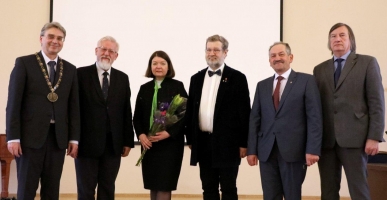
A general assembly of the members of the Lithuanian Academy of Sciences was held on 25 February 2020. Professor Jūras Banys, President of the Lithuanian Academy of Sciences, who chaired the meeting, introduced the guests of the event – Tarmo Soomere, President of the Estonian Academy of Sciences, Rein Raud, a professor at Tallinn University – both new foreign members of the Lithuanian Academy of Sciences, as well as Jana Vanaveski, Ambassador of the Republic of Estonia to the Republic of Lithuania, and Mart Tarmak, counsellor on economic and cultural affairs at the Embassy, the laureates of the competitions of the Lithuanian Academy of Sciences, Audrys Antanaitis, chair of the State Commission of the Lithuanian Language, and Dr Vilija Ragaišienė, the Commission’s programme director. Prof. Banys pointed out that the Academy gathered to honour young researchers at the time when EU support critical for research and innovations was being discussed in both the European Union and Lithuania.
The assembly observed a moment of silence in honour of recently deceased members, Marijus Arvydas Šliogeris and Edvardas Gudavičius. This was followed by congratulations to Prof. Vilijandas Bagdonavičius on the occasion of his 70th birthday.
Prof. Zenonas Dabkevičius, Vice-President of the Lithuanian Academy of Sciences, read the text of the diplomas of Tarmo Soomere and Rein Raud, the new foreign members of the Academy, while Prof. Banys awarded the membership badges and diplomas to them.
In his inaugural address, Prof. Soomere spoke about the relationship of modern science and its representatives, the researchers, with society and its expectations. The fundamental challenge of the twenty-first century is not only creating information but also the best possible transmission of this information to others, in particular bearing in mind the fact that the trust in science and experts has recently become somewhat fragile. At present, the critical task facing the scientist is the understanding of how society interprets information. Therefore we must keep asking ourselves: what are people and society thinking, what do they know, and how would society use the correct answer. More 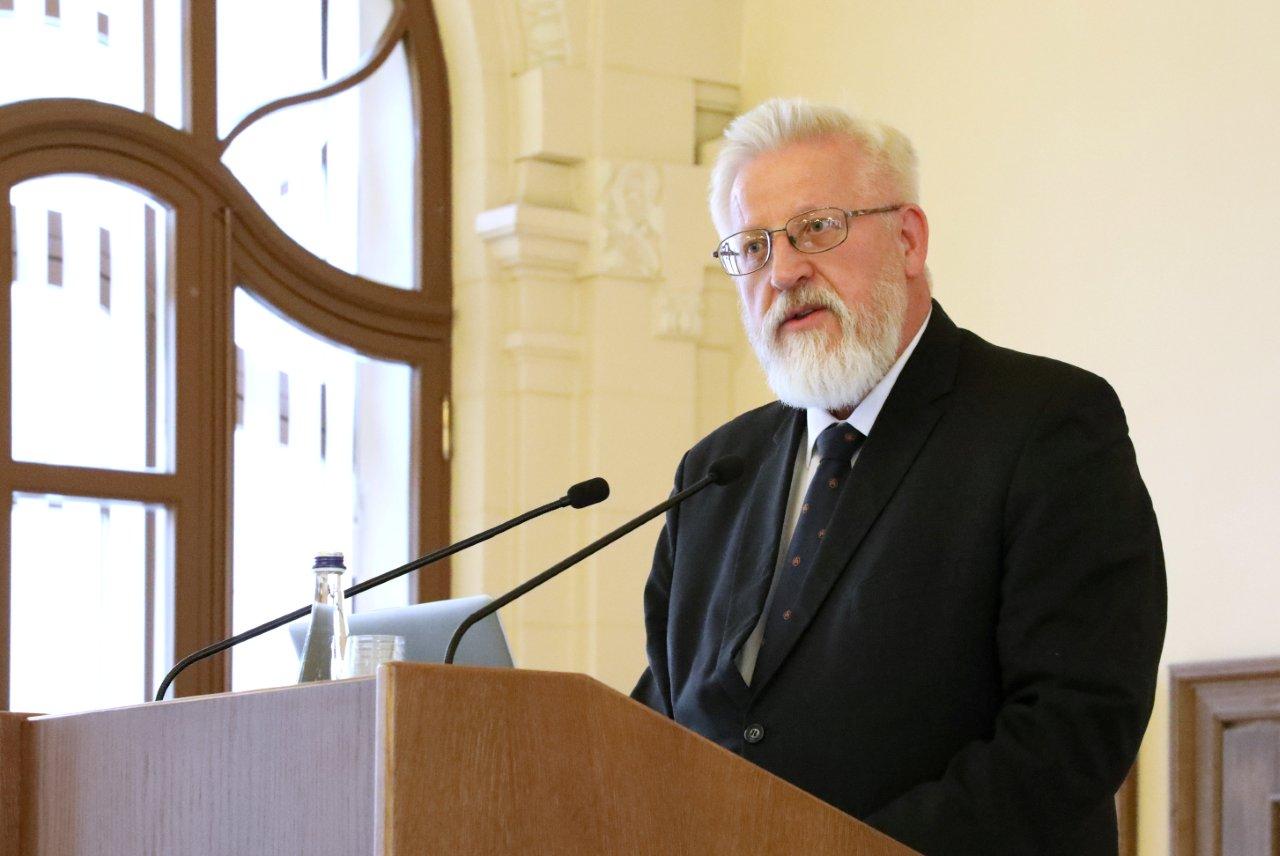
Tarmo Soomere, President of the Estonian Academy of Sciences and a foreign member of the Lithuanian Academy of Sciences
Professor Rein Raud emphasised that researchers are united by their desire to question what is obvious. That includes even the criteria of the evaluation of reality. It is highly important because in the field of humanities and social sciences, reality has undergone changes during the recent decades: the hierarchical model of culture broke dow at the end of the twentieth century. It no longer makes sense speaking of high and popular culture and it is no longer acceptable to rate it. According to Zygmunt Bauman, it has transformed into liquid power. In Raud’s opinion, these are positive shifts as now we can – without feeling degenerates – choose cultural output boldly and freely. Culture could be defined as a system of resources that impart meaning to our world and our worldview. We must understand that cultural meanings migrate and the cultural process does not actually have a direction. That is why the concept of open culture is the most promising as it enables society and the individual to develop, create, and apply cultural innovations. Meanwhile, the closed conservative culture that seeks to retain its purity is facing the danger of disintegration.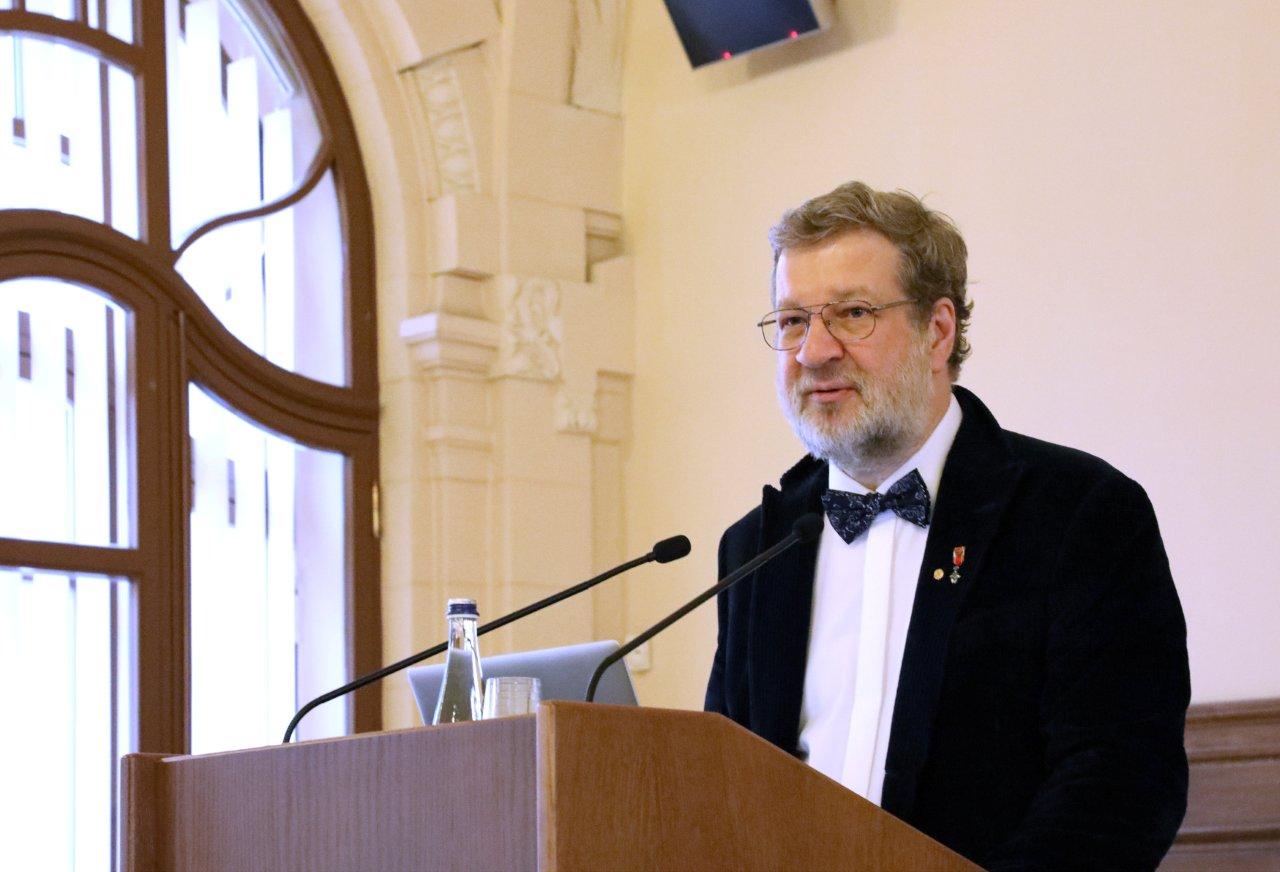
Rein Raud, a professor at Tallinn University and a foreign member of the Lithuanian Academy of Sciences
After the inaugural speeches of the new foreign members of the Academy, the assembly moved on to the next item of its agenda – awards of the winners of the competition for the best research works by young researchers and doctoral students. Prof. Zenonas Dabkevičius read the resolution of the Presidium of the Lithuanian Academy of Sciences regarding the winners of the competition for the best research works by young researchers and doctoral students 2019. Based on the results of the competition, Prof. Jūras Banys, President of the Academy, presented ten prizes and a number of certificates of merit to the following winners of this competition:
Division of humanities and social sciences:
Dr Martynas Jakulis (Vilnius University), diploma;
Dr Ineta Žičkutė (Kaunas University of Technology), diploma;
Dr Jolita Čeičytė (Kaunas University of Technology), certificate of merit.
Division of mathematics, physics, and chemistry sciences:
Dr Sima Rekštytė (Vilnius University), diploma;
Dr Aleksejus Žarkovas (Vilnius University), diploma;
Dr Marijonas Tutkus (Vilnius University, Centre for Physical Sciences and Technology), certificate of merit.
Division of biological, medical, and geosciences:
Dr Giedrė Trakinienė (Lithuanian University of Health Sciences), diploma;
Dr Rapolas Žilionis (Vilnius University Life Sciences Centre), diploma;
Dr Justas Dainys (Nature Research Centre), certificate of merit.
Division of agricultural and forestry sciences:
Dr Karolina Barčauskaitė (Lithuanian Research Centre for Agriculture and Forestry), diploma;
Dr Juliana Lukša (Nature Research Centre), diploma.
Division of technical sciences:
PhD student Linas Jonušauskas and Dr Darius Gailevičius (Vilnius University), diploma;
Dr Marijanas Jurgo (Vilnius Gediminas technical University), diploma;
Dr Gintarė Kručaitė (Kaunas University of Technology), certificate of merit.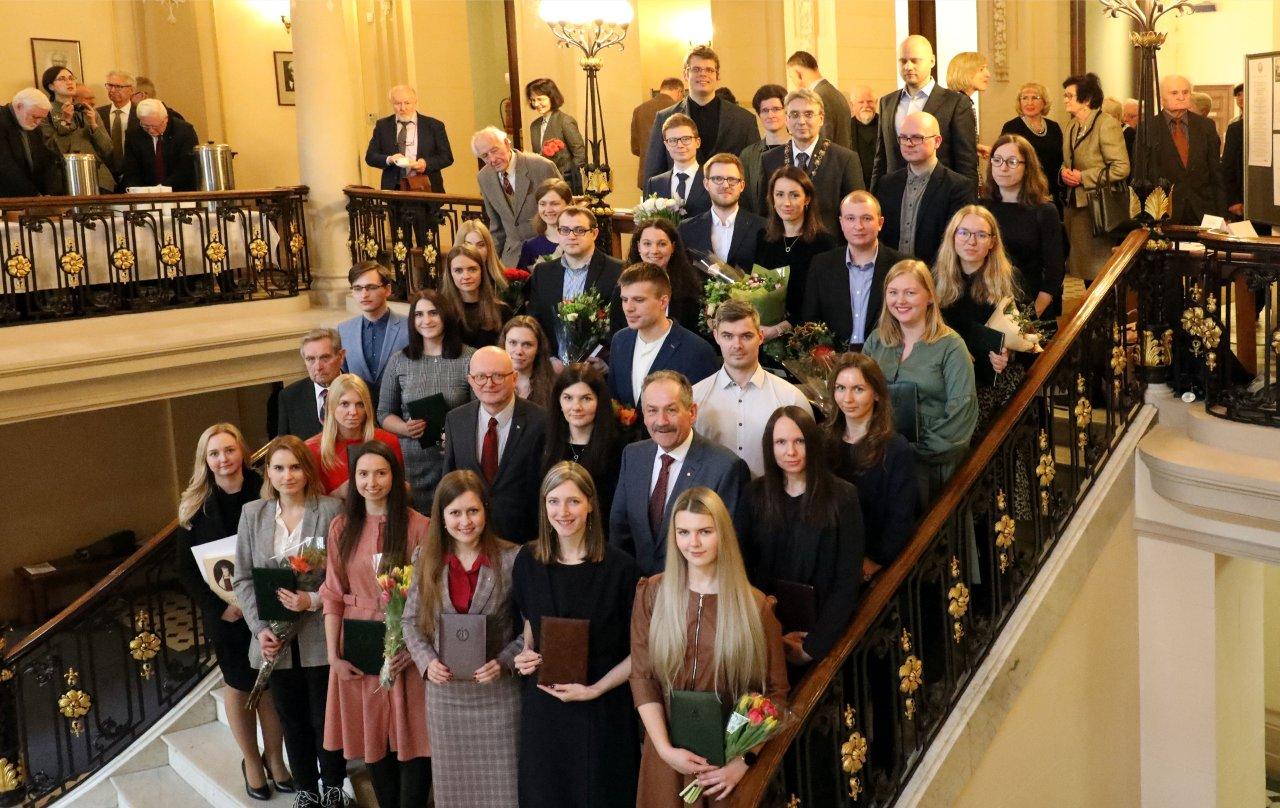
The laureates of the competition for the best research works by the students in higher education 2019 were also honoured at this general assembly. Prof. Zenonas Dabkevičius read the resolution of the Presidium of the Lithuanian Academy of Sciences regarding the winners of the best research works by the students in higher education in 2019, and Prof. Jūras Banys presented fourteen diplomas and a number of certificates of merit to the winners.
Division of humanities and social sciences:
Dalia Aleksandravičiūtė, MA (Vilnius Academy of Arts), diploma
Monika Aleksė (Čeponytė), MA (Vytautas Magnus University), diploma
Eglė Dmukauskaitė, MA (Vilnius University), diploma
Aistė Žvinytė, MA (Vilnius Academy of Arts), diploma
master student Paulius Balsys (Vytautas Magnus University), certificate of merit.
Division of mathematical, physical, and chemical sciences:
Mantas Lukauskas, MSc (Kaunas University of Technology), diploma
Vaida Paketurytė, MSc (Vilnius University), diploma
Gintarė Plečkaitytė, MSc (Vilnius University), diploma
Ignas Čiplys, MSc (Vilnius University Life Sciences Centre), certificate of merit.
Division of biological, medical, and geosciences:
Enrika Juzėnaitė, MSc (Vilnius University), diploma
Gunda Petraitytė, MSc (Vilnius University), diploma
master student Giedrė Skliutė (Vilnius University Life Sciences Centre), diploma.
Division of agricultural and forestry sciences:
master student Aušra Bakšinskaitė (Lithuanian Research Centre for Agriculture and Forestry), diploma
master student Urtė Stulpinaitė (Lithuanian Research Centre for Agriculture and Forestry), diploma.
Division of technical sciences:
Dovilė Kuizinienė, MSc (Vytautas Magnus University), diploma
master student Gabrielė Šarapajevaitė (Kaunas University of Technology), diploma
Edvinas Skliutas, MSc (Vilnius University), diploma
master student Dovydas Blaževičius (Kaunas University of Technology), certificate of merit.
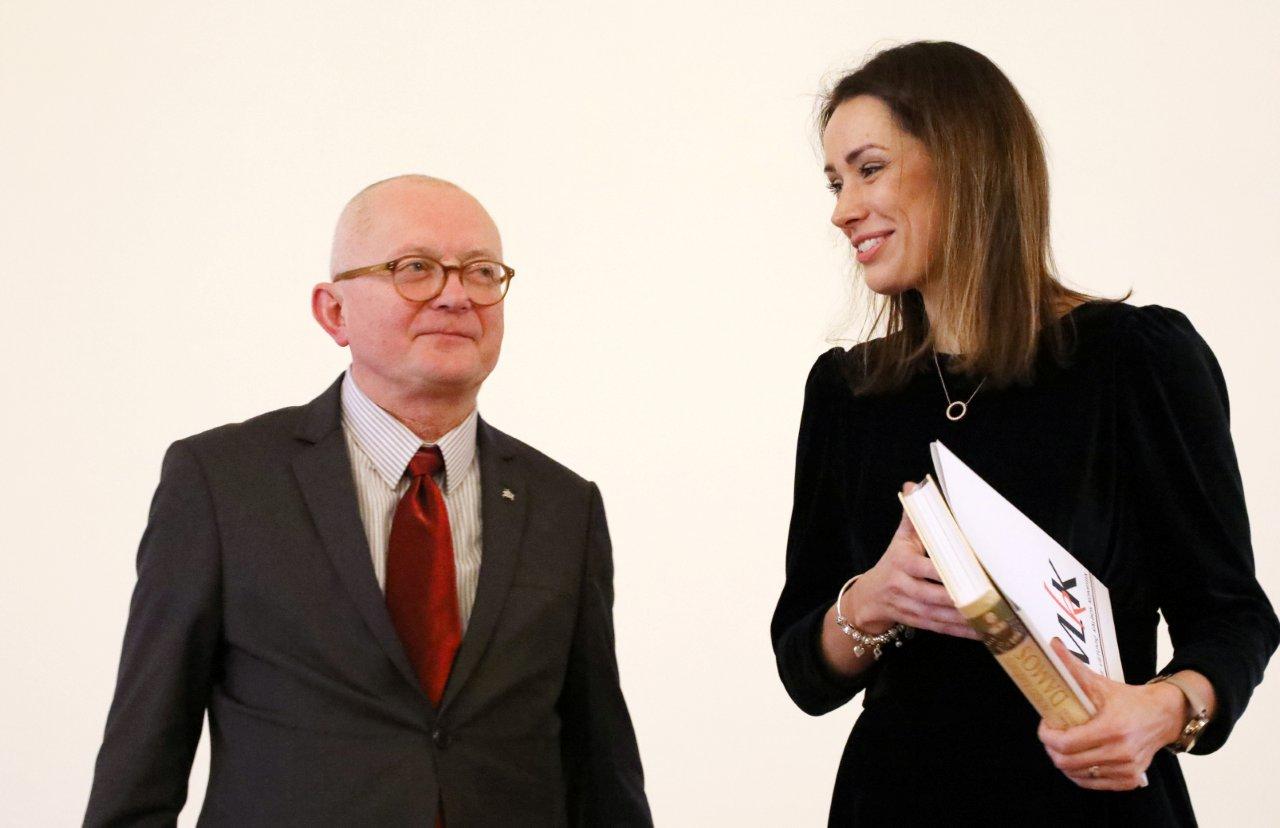
Audrys Antanaitis, Chair of the State Commission for the Lithuanian Language, and Vaida Buivydienė
This ceremony was followed by the awards of the State Commission of the Lithuanian Language. They are intended for the authors of research works submitted for the competitions organised by the Lithuanian Academy of Sciences in 2019 for the most fluent Lithuanian language. Audrys Antanaitis, chair of the State Commission of the Lithuanian Language, expressed his satisfaction at the fact that the Lithuanian language of almost all submitted works was fluent and correct. Thus, he said, the Lithuanian researchers are paving the road to the future of the Lithuanian language. Incidentally, this year’s awards went exclusively to the humanities scholars, although in previous years the works by researchers in other fields were singled out. Audrys Antanaitis announced the winners of this year’s awards:
Vaida Buivydienė’s study ‘Socio-cultural circumstances of (self)formation of standard Lithuanian in the first half of the twentieth century: features of the content and language standardisation in the primary school textbooks of the native language’ (Faculty of Creative Industries, Vilnius Gediminas Technical University);
Ernesta Kazėnaitė’s doctoral work ‘Connections between the fragments of the sixteenth-seventeenth-century Lutheran Latvian Bible and Glück’s translation of the Bible (1685–1694)’ (Faculty of Philology, Vilnius University; Institute of Lithuanian Literature and Folklore);
Monika Triaušytė’s master’s work ‘(Self)value of linguistic homeland and the perception of the linguistic environment: the images of borderland Samogitians (Institute of Language, Literature, and Translation Studies, Kaunas Faculty of Vilnius University).
Dr Rolandas Maskoliūnas, chief specialist for public relations
Photography Virginija Valuckienė
